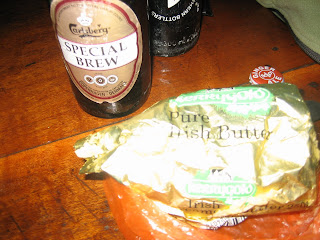19 June 2007
I witnessed a fellow human being suffering and I did nothing – I didn’t move one muscle, made no action, voiced no objective. Me, a social worker: "Social workers are sensitive to cultural and ethnic diversity and strive to end discrimination, oppression, poverty, and other forms of social injustice" (NASW, 2000a, p. 1).
I witness suffering at home, the homeless, the poor, the hungry, begging, but I often walk on by without much thought. This was different from that suffering, it was so raw, I was so present, and the opportunity to intervene in a tangible way was so available to me.
And I did nothing.
We were on the way to Lilongwe for a World Bank meeting and Sakala stopped at a gas station to fill up the minibus. I vaguely saw someone come to his window, perhaps to beg for money, hard to see from the backseat. I saw a man who works at the gas station push the person aside and she fell, I think. Then I heard Nicole, who was in the front seat say, almost to herself, “Oh no don’t drag her………..Oh she’s sick.” Her tone was upset, implied the person was not well off, and needed help. Then I saw the man drop the person in a heap on the ground, in the dirt, against a bicycle that had fallen over, in front of a group of young men standing around in the doorway to the gas station building. The girl lay with her head face down, in the dirt, and her chest/back heaved as if she was sobbing.
No one did anything.
The young men all looked at her/ignored her. We all stared from inside the van but did or said nothing. I remember wanting to do something but not knowing what to do – caught up in my own fear, my own inadequacy. Scared to get out, not knowing what was wrong with her, not knowing what the young men would say or do if I, a muzungu approached her, not knowing what she would do, scared because she was “sick” (but not even knowing if she was - it was just what Nicole said - or what sick meant). A man went up to her and tried to give her something, perhaps food? She wouldn’t/couldn’t lift her head. More time passed as we waited for change, it felt like a very long time as we all watched and did nothing.
I did nothing.
Another young man went up to her to try to give her food, it looked like a handful of peanuts. She finally lifted her head, dirt all over her face, mucus coming from her nose. She got up and took the peanuts. She was filthy, with tattered clothes and held one arm as if it was palsied, dragged a foot. She shuffled off, so clearly in need. Desperate enough to throw herself against the side of the van, to beg, to be dragged off, to lie face down in the dirt, to accept a handful of peanuts, to shuffle off with nothing, with us all staring but giving her nothing.
And we did nothing, this group of people here to do research on HIV because we care? and want to help, to make a difference, to end the suffering, to address the multiplicative health issues facing developing nations. We did nothing to help one person who was in immediate need of help, of something, perhaps just a comforting hand and a little money, a sign that another human being cares about her suffering.
We did nothing.
I did nothing.
Ann talked last night about maternal bonding, how perhaps part of the reason that the bond is so instantaneous and strong is related to a mother knowing she is it, she is ultimately responsible for another human being. We talked about this in the context of the literature on altruism, group think, and the individual inclination to help another human being in need. How if you know you are the only one who can help/care for another you will, but once there are others who share the responsibility, we are less likely to act. We discussed this last night! And today the very situation presented itself and we did nothing.
I did nothing.
I failed in my humanness.



 My frequent showering partner in Mchinji
My frequent showering partner in Mchinji
 My frequent showering partner in Mchinji
My frequent showering partner in Mchinji












 and Carlsberg beer, not that I am complaining .
and Carlsberg beer, not that I am complaining .
 Nicole and Emily preparing for the carnage.
Nicole and Emily preparing for the carnage.
 I’m jealous and want very badly to purchase one of the bikes to ride while here. They are the main mode of transportation in Malawi, both personal and public – bike taxis are everywhere. Here are some bike lust pics
I’m jealous and want very badly to purchase one of the bikes to ride while here. They are the main mode of transportation in Malawi, both personal and public – bike taxis are everywhere. Here are some bike lust pics


 IKI headquarters and my working home for the next few weeks.
IKI headquarters and my working home for the next few weeks. We look like we are working but we are really obsessively checking for an internet signal and cursing the access gods.
We look like we are working but we are really obsessively checking for an internet signal and cursing the access gods.

